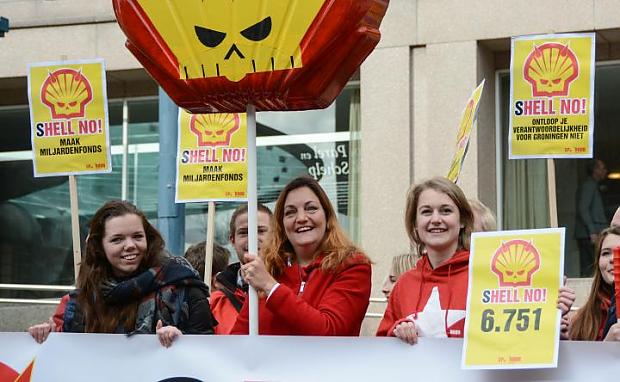A better environment begins with the state, Shell and Exxon
A better environment begins with the state, Shell and Exxon

Raisa is a woman in her twenties, well educated, with a good job and the first house of her own. You'd think this would be a sound basis for a fine future, but it turns out that nothing could be further from the truth. Her house has suffered so much damage as a result of the gas extraction practised in Groningen, in the north of the Netherlands, where Raisa lives, that it has been declared unsafe and uninhabitable. Then came hope, however. Agencies came up with a plan to make the house safe again. Meanwhile she's living in a lean-to adjacent to it. Then she gets a letter telling her that reinforcement of houses in the region of Groningen which has suffered earthquakes as a result of the gas extraction is to be suspended. And the last shreds of hope which Raisa still placed in the government and the companies responsible for this catastrophe disappeared.
By Sandra Beckerman and Lisa de Leeuw
The disaster in Groningen has been caused by gas extraction by the Dutch government and NAM, which belongs to Shell and Exxon. Yet it's the people themselves who have to pay for the damage, as well as for climate change. They are paying the price not only in unsafe houses and in insecurity, but also quite literally. Ordinary people will have to pay €2.8 billion more than the cost of pollution on solving the problems it brings, while the industry, corporations such as Shell and Exxon, will pay €1.8 billion less.
The government's adage is 'A better environment begins with yourself', but it actually begins mainly with these massively polluting companies and the government which protects them. While you can boycott Shell, the Dutch state along with Shell and other Dutch fossil corporations tap into new markets. And if, like 69% of the country's population, you go over to green electricity, it turns out that in fully half of cases, as a result of clever tricks perpetrated by energy corporations, you will still be paying for fossil energy.
Not only is our power as consumers not sufficient to enable us to offer a serious challenge to the power of big capital, it actually undermines once more the collective struggle which is really necessary. 'A better environment begins with yourself' is for some a call to action, but for others a rebuke. Members of a well-educated elite have the financial resources to buy organic meat and pick their way through the rules on energy subsidies. At the same time, the viability of social housing is coming under pressure as tenants are landed with hefty rent increases. People on low incomes pay, in relative terms, the highest price for the country's climate policies, thus perpetuating and even exacerbating existing inequality. Collectively organised resistance from below aimed at creating a just economy will not arise if the majority of people are unable to participate. For that, you need everyone.
Dutch climate policy is unjust and ineffective. Despite the enormous contribution from consumers, Shell's and Netherlands' greenhouse gas emissions are rising and inequality is increasing. If we want a secure future, climate policies are needed which force the real polluters to pay. The hope which Raisa has lost has fortunately not entirely disappeared. An ever-growing world-wide movement is insisting that 'A better environment begins with Shell and their pals in governments.' And because a fifth of global greenhouse gas emissions are caused by corporations, the role on investors in resisting climate change is enormous. The State of New York, sixty British universities, the world's biggest pension funds, the biggest German bank and the Catholic Church are already demonstrating that often, under pressure from major protests, investments will be withdrawn from unsafe fossil energy.
It's time that the Netherlands followed this example. We must put more pressure on the state, and Shell and other multinationals, to accept their responsibility for the disaster in Groningen and for the climate problem. The civil servants' pension fund ABP, for example, invests €1.8 billion of our pension moneys in Shell en Exxon. On May 22nd Shell's shareholders meet in Scheveningen, a good opportunity for ABP and other investors to face up to their responsibilities and, just as others have done across the world, to call a halt to fossil investments and go over to investments from which we all profit. A better environment begins with calling out Shell, other corporations, and the state.
Sandra Beckerman is a Member of Parliament for the SP. Lisa de Leeuw is Chair of ROOD, the SP's youth movement.
